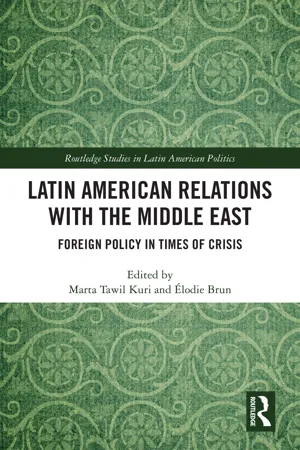
Latin American Relations with the Middle East
Foreign Policy in Times of Crisis
- 272 pages
- English
- ePUB (mobile friendly)
- Available on iOS & Android
Latin American Relations with the Middle East
Foreign Policy in Times of Crisis
About This Book
Latin American Relations with the Middle East surveys the dealings of ten Latin American and Caribbean states – Argentina, Brazil, Chile, Colombia, Costa Rica, Cuba, Peru, Mexico, Uruguay, and Venezuela – with the Middle East.
This volume examins these states' external behavior at both an empirical and conceptual level. Empirically, authors seek to examine Latin American and Caribbean foreign policies towards the Middle East in four dimensions: diplomatic attention; trade and investment (including the energy issue); development cooperation; security matters/intelligence, and relationship with multilateralism (Iran, Palestine, and Syria). Case studies are selectively deployed to observe the influence of unfavorable circumstances that have increased since 2015, such as domestic turmoil, wars, economic crisis, ideological bias, and international constraints. Conceptually, the book enhances the theoretical framework for understanding Southern countries' foreign policies, through fomenting dialogue with Latin American and Caribbean regional literature on foreign policy. Authors inquire about how decision-making processes occur, and uncover how influential actors help to test the main hypotheses of Foreign Policy Analysis (FPA).
Forging essential new paths of inquiry, this book is a must read for researchers of International Relations, Foreign Policy, South-South Relations, Latin American Politics, and Middle Eastern Politics.
Frequently asked questions
Information
1 Under the Western Sign Argentina’s Relations with the Middle East during Mauricio Macri’s Government
1 Introduction
2 Contextualizing Change
2.1 The Local, the Regional, and the Global According to Cambiemos
Table of contents
- Cover
- Half Title
- Series Page
- Title Page
- Copyright Page
- Table of Contents
- List of Figures
- List of Tables
- Coordinators and contributors
- Prologue
- Introduction
- 1 Under the Western Sign: Argentina’s Relations with the Middle East during Mauricio Macri’s Government
- 2 Looking Inward, Moving Outward: Brazil’s Middle East Policy as a Case of Domestic Dynamics
- 3 Presidential Influence, Economic-Military Legacies, and Bureaucracy Challenges in Chile’s Foreign Policy toward the Middle East
- 4 A Multifactorial Analysis of the Colombian Foreign Policy toward the Middle East
- 5 The Foreign Policy of Costa Rica toward the Middle East: Rapprochement and Economic Interests
- 6 Cuba’s Foreign Policy toward the Middle East: Between Traditions, Collaboration, and Economic Adjustments
- 7 Mexico’s Foreign Policy toward the Middle East: Individual Preferences and Bureaucratic Politics in a Changing International Environment
- 8 Between Multilateralism and Realpolitik: The Relationship of Peru with the Middle East
- 9 Uruguayan Foreign Policy toward the Middle East: Changes during the Frente Amplio’s Governments
- 10 Venezuela and the Middle East: “Revolutionary” Foreign Policy, Soft Balancing, and Survival Strategy
- Main Findings on Latin American and Caribbean Foreign Policies toward the Middle East: Dialoguing with Mainstream Research
- Index